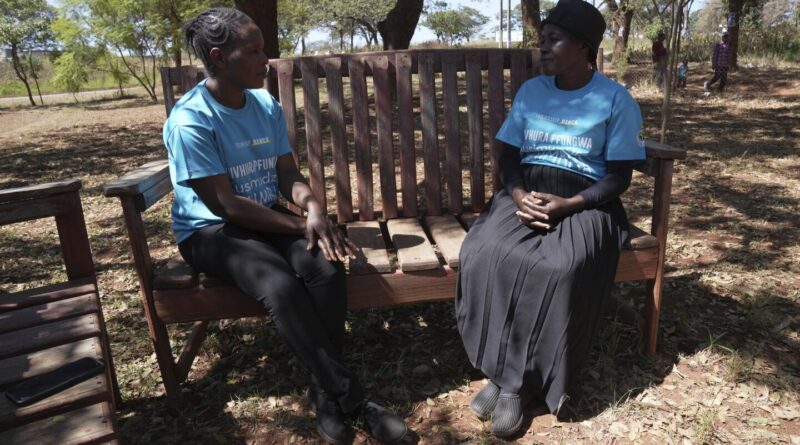Grandma’s bench and ear: A Zimbabwean psychotherapeutic novel spreads overseas
HARARE, Zimbabwe (AP) – After her son, the family’s shining light and sole breadwinner, was arrested last year, Tambudzai Tembo fell apart. In Zimbabwe, where mental health services are scarce, her chances of getting professional help were slim. He thought about killing himself.
«I didn’t want to live anymore. People who see me would think that everything is fine. But inside, my head was spinning,» said the 57-year-old. «I was alone.»
A wooden bench and a sympathetic grandmother saved him.
Elderly people are at the center of a local form of mental health treatment in Zimbabwe that is now being accepted in places like the United States.
This approach includes setting up benches in quiet, discreet corners of community clinics and some churches, poor neighborhoods and universities. An older woman with basic therapy training in patient problem solving sits there, ready to listen and engage in one-on-one conversation.
This treatment is inspired by the tradition of Zimbabwe where grandmothers were the people who sought wisdom in difficult times. It had been abandoned due to the growth of cities, the destruction of close-knit families and modern technology. It is now working again as mental health needs increase.
«Grandmothers are the custodians of the local culture and wisdom. They are rooted in their communities,» said Dixon Chibanda, professor of psychiatry and founder of the project. «They don’t go away, and what’s more, they have an amazing ability to use what we call ‘expressive empathy’ … to make people feel respected and understood.»
Last year, Chibanda was selected as the winner of a $150,000 prize by the US-based McNulty Foundation for transforming mental health care. Chibanda said the idea has taken root in parts of Vietnam, Botswana, Malawi, Kenya, and Tanzania and is «in the early stages» in London.
In New York, the city’s new mental health plan launched last year says it is «drawing inspiration» from what it calls the Friendship Bench to help tackle dangerous situations like isolation. Orange benches are now in places including Harlem, Brooklyn and the Bronx.
In Washington, the HelpAge USA organization is testing this idea under the DC Grandparents for Mental Health project, which started in 2022 as a COVID-19 support group for people 60 and older.
So far, 20 grandmothers who aim to «break the stigma around mental health and make it easier to talk about feelings» have been trained by the Friendship Bench Zimbabwe team to listen, empathize and empower others to solve their problems, said Cindy Cox-Roman. , president and CEO of HelpAge USA.
Benches will be set up at places of worship, schools and health centers in Washington’s low-income communities where there are people who have been «chronically excluded and may have mental health issues.» ,» he said.
Cox-Roman cited fear and distrust of the medical system, lack of social support and stigma as some of the factors that hinder access to treatment.
«People are hurting, and grandma can always make you feel better,» she said.
«We have a lot of wisdom in our senior citizens and hands that can be opened. I refuse to age. Sometimes age brings wisdom that you don’t learn until you are old,» one of the grandmothers, 81-year-old Barbara Allen said in a promotional video.
According to the National Institute of Mental Health, more than one in five people in the United States lives with a mental illness.
«The problems of mental health are real. The real crisis after the epidemic is that many doctors have retired,» said Dr. Jehan El-Mayoumi, who works a consultant with HelpAge USA and founding director of the Rodham Health Center at Georgetown University. . He has struggled to find psychiatrists for the most suicidal patients.
El-Mayoumi said the concept of Zimbabwe gives people «someone you can trust, you can confide in, you can tell your deepest secrets (and) need to trust each other, so that’s a great thing about Bench of Friendship.
This idea was born out of tragedy. Chibanda was a young psychiatrist, and one of the top 10 in Zimbabwe in 2005. One of his patients wanted to see him, but he couldn’t afford it. $15 for the bus. Chibanda later learned that he had committed suicide.
«I realized I needed to have a strong presence in the community,» Chibanda said. I realized that actually one of the most important resources are these grandmothers, the guardians of the local culture.”
She recruited 14 grandmothers from the neighborhood near the hospital where she worked in the capital, Harare, and trained them. In Zimbabwe, they get $25 a month to help with transport and phone bills.
The network, which now collaborates with the Ministry of Health and the World Health Organization, has grown to more than 2,000 grandmothers across the country. More than 200,000 Zimbabweans sat on the bench to receive treatment from a trained grandmother in 2023, according to the internet.
Siridzayi Dzukwa, the grandmother who talked Tembo into killing herself, visited her home recently. Using a questionnaire, he assessed Tembo’s progress. He listened as Tembo talked about how he found a new life, and now sells vegetables for a living.
Dzukwa has become a household name in the area. People stop to greet him and thank him for helping them. Others ask for a home visit or take down his number.
He said: «People are no longer ashamed or afraid to stop us openly on the streets and ask us to speak. «Mental health is no longer something to be ashamed of.»
___
The Associated Press receives financial support for global health protection and development in Africa from the Bill & Melinda Gates Foundation Trust. AP is solely responsible for all content. Find APs standards for working with philanthropies, a list of sponsors and shelters funded by AP.org.
___
AP Africa News: https://apnews.com/hub/africa
#Grandmas #bench #ear #Zimbabwean #psychotherapeutic #spreads #overseas
